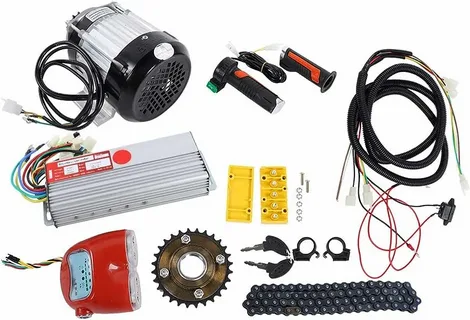Basic things to know about Electric Motor Conversion Kits
With more electric vehicles hitting the market, it seems that more and more people are interested in trying to convert their bicycles or vehicles into electric-powered ones. Electric bikes are far less expensive than vehicles. They can easily be upgraded by literally just swapping out the motors. But, what is the cost of an electric motor conversion? Are there electric motor conversion laws? Is it possible for you to build an electric motor on your own? In this guide, we’ll cover all details of electric motors conversions so you can decide whether or not these upgrades suit your needs.
What is an Electric Motor Conversion Kit?
An electric motor conversion kit refers to parts that are meant for changing standard bicycles, motorcycles, or even cars into electric powered ones. Usually, these kits come with:
– Electric Motors which are the primary parts that power motorcycles or bikes.
– Battery Packs which provide adequate energy to power the Motor.
– Split Power Controllers which manage the electric power transferred to the motor and the battery.
– Throttle controls or sensors that can track pedal movements- essentially help in speed as well as power control.
All parts are fixed in a proper manner with the help of Wiring and Mounting Hardware- the components that allow a thorough connection, locking all systems together in a secure manner.
The purchase of a factory made electric vehicle is not required due to conversion kits being widely available for bicycles, motorcycles, and even cars. Conversion kits enable users to modify their vehicles.
What is the Price of Electric Motors?
Electric motors, like all devices, come with a price. The main factors of these types of motors are brand, battery capacity, power and the price.
Costs of Electric Bikes
If you want more features, the price range would be $200 to $1500. However, those aiming for a budget the price would range from $200 to $500. Kits with midrange ($500- $1000) offer pedal assist and throttle, and premium kits ($1000- $1500) offer better range.
Other Expenses:
Administration fee (if you wish to be professionally installed): $50 to $300
Battery: $200 to $800 depending on the type selected.
Costs of Electric Vehicles
Electric motors for cars incur other expenses around $5000 to $20000.
Basic Kits ($5000- $8000): Changes operation for light vehicles like motors with underpowered batteries.
Upgraded Kits ($8000- $12000): Better expected usability as well as modified battery endurance and speed.
High-End Kits ($12,000 – $20,000+): Kits of high-performance caliber with long-range and high-speed capabilities.
Professionally installed car conversions may add an additional $3,000 to $10,000, depending on how complicated they are.
If you’re pondering about the cost of an electric motor conversion, it isn’t straightforward because it depends on the vehicle type and power requirements. Bicycles offer an affordable entry point while cars need a hefty investment.
Are Electric Bike Conversion Kits Legal?
It is advisable to confirm local laws before buying a conversion kit. A frequent concern is: Are electric bike conversion kits legal?
UK and EU Laws
In many parts of Europe, including the UK, eBikes can be used if they satisfy certain conditions:
The motor can’t exceed 250W.
The maximum speed for assisted riding has to be 15.5 mph (25 km/h).
A pedal is required to activate the motor (throttles that work without pedaling may not be road legal).
If an eBike exceeds these boundaries, it could potentially be classified as a moped or motorcycle which would require insurance, registration, and a license.
US Laws
Whether electric bike conversion kits are legal in the US is a question of the state, but generally speaking:
Class 1 and Class 2 eBikes (up to 750W and 20 mph) are widely accepted.
Class 3 eBikes which go up to 28 mph may have additional limitations.
If your converted eBike goes above 750W or has a throttle only system, it may be deemed a moped or motorcycle.
Conversions of Vehicle
Electric car and motorcycle conversions are allowed in many parts of the world. However, they need to follow road safety and emissions standards. In some areas, modified cars need to go through a verification and certification process to legally drive on public roads.
Is It Possible To Make A Personal Electric Motor?
If you are an enthusiast, you may have asked, Is it possible to make a personal electric motor? The answer isn’t as simple as yes; having technical skills along with some specific tools makes it easier.
Basics of DIY Electric Motors
An electric motor is made up of:
– Copper Coils: They generate magnetic fields
– Magnets: They create movement which interacts with the coils
– Power supply source: Usually batteries
– Rotor and Stator: They help transform energy into motion
It is fairly easy to make a small electric motor for experimentation and science projects. In contrast, creating high-powered electric motors for vehicles is extremely difficult.
Hurdles of Designing Electric Motors
Motors need careful and precise engineering as well as placing the magnet and motor winding.
Power Management – Selecting inappropriate controllers can lead to overheating or malfunctioning of motors.
Material Costs – Some components, such as neodymium magnets and quality copper, can be costly.
Efficiency Issues – Often, homemade motors will never have the efficiency of professionally manufactured ones.
An electric motor can be built, but a pre-made conversion kit is easier than designing a custom one from scratch.
How to Choose the Right Electric Motor Conversion Kit
If you’re looking to convert a bike, car, or motorcycle, the following tips will help you choose the most appropriate kit:
For Electric Bikes
Power Output – If you’re riding on public streets, stay within the limits.
Battery Range – Lithium-ion batteries that can go for 30-50 km are preferred.
Compatibility – Check if the kit is compatible with your bike’s frame and wheel size.
For Cars and Motorcycles
Motor Efficiency – Prefer a brushless DC motor for better efficiency.
Battery Capacity – Longer range can be provided with higher voltage packs like 72V or 96V.
Weight Considerations – These conversions may add extra weight which may alter the handling.
Conclusion
It’s simple and affordable to switch to an electric vehicle using an electric motor conversion kit, whether you’re retrofitting a classic car, changing a bike into an e-bike, or turning a regular bike into an environmentally friendly bicycle for commuting. These projects can be done as a DIY, and the kits available can usually be installed without too much difficulty.
Different vehicle types and performance needs affect the prices of electric motor conversion. This means a beginner’s bicycle might set you back around $200 to $20,000, while a sports car conversion would set you back even more.
As for the question, “Are electric bike conversion kits legal?” It mostly depends on local road laws and the power of the motor used. Make sure to investigate any applicable rules or laws before proceeding with any requests.
Finally, it is possible to do it yourself, but the materials and skills involved are quite complex. Most consumers would benefit from purchasing a quality conversion kit.




Post Comment